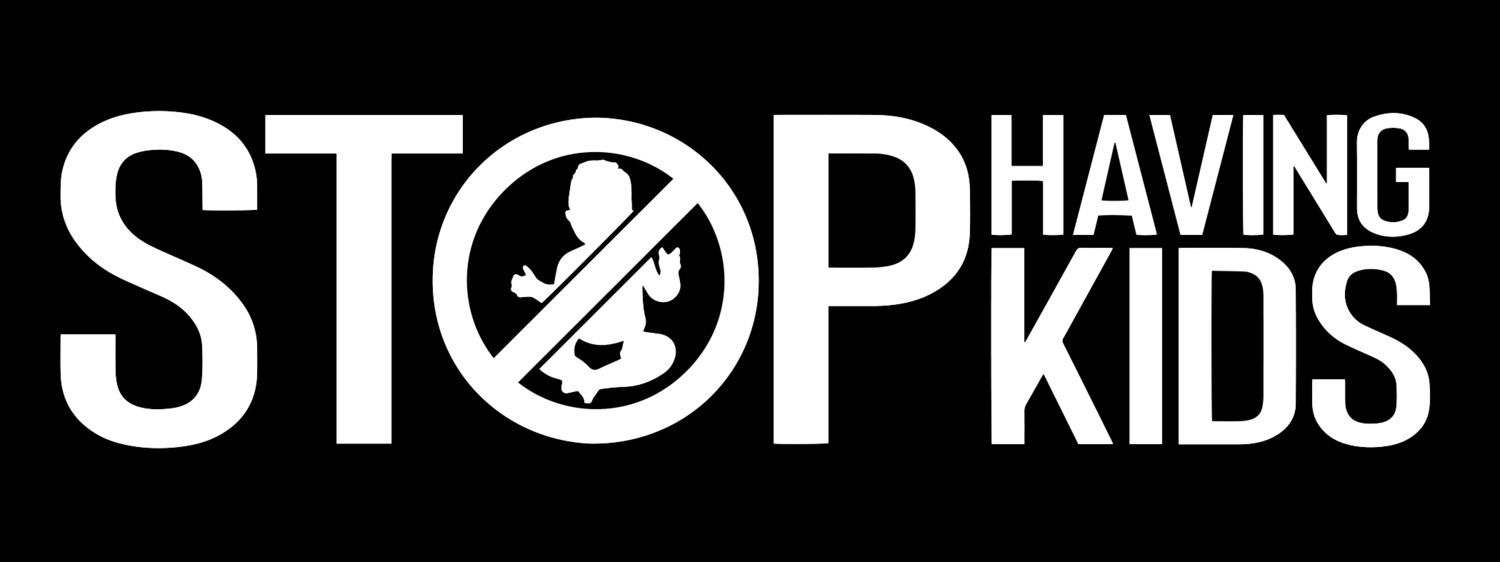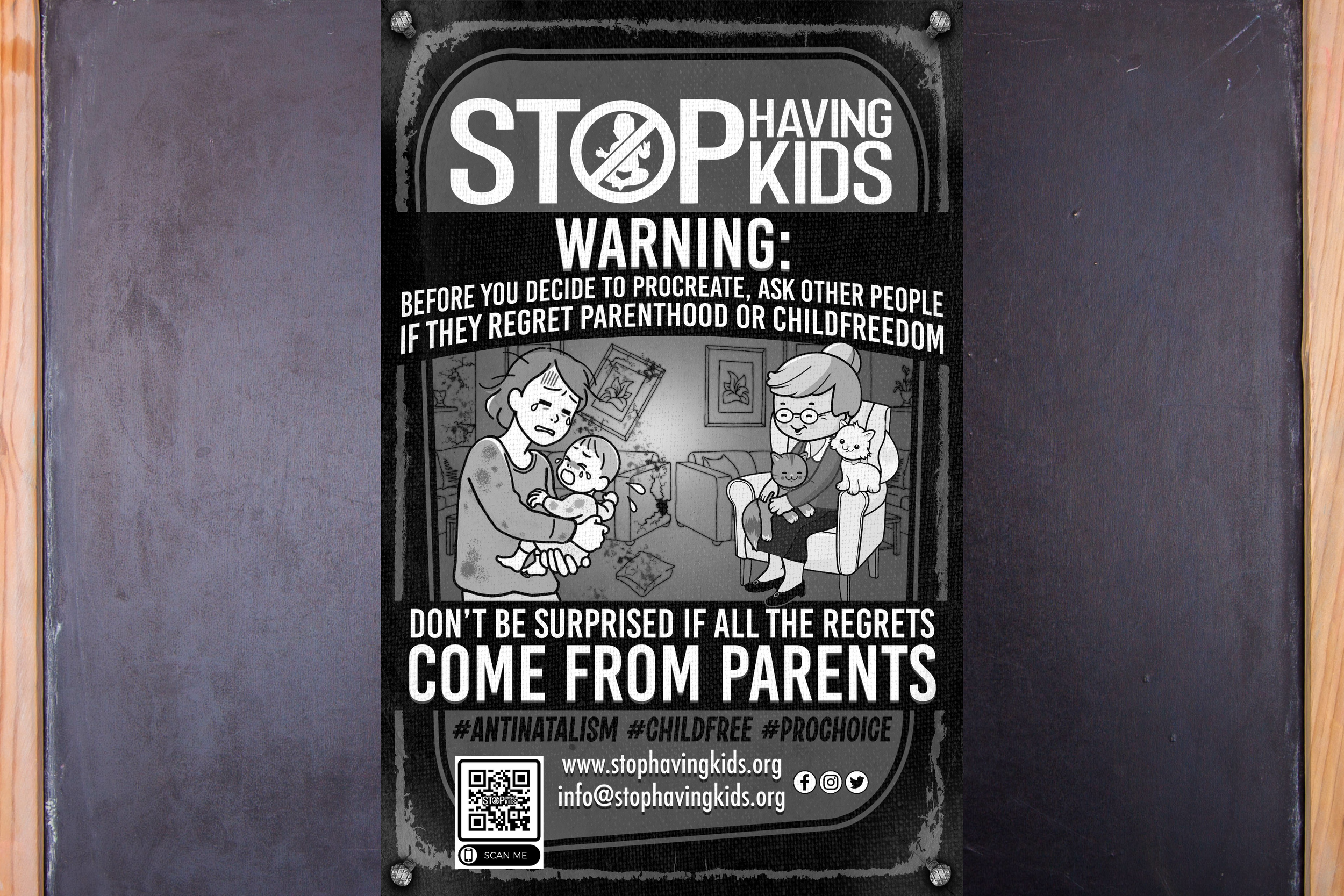Parenthood Regret - Real, Rampant, Rejected
A Repressed Epidemic
Read More
There is a silent epidemic going on and that is parenthood regret. This form of regret can come during pregnancy, following labor, or years after childbirth. From a young age society ingrains in us a notion that it is natural and mandatory to birth children, reinforced through the promise of fulfillment, regardless of personal desire. The idea of being an intentional non-parent is demonized and discouraged with threat of regret—insinuating one cannot find joy or self-actualization without procreation. Regret is weaponized to enshrine the act of procreating through coercion and pressure, often, at the expense of the individual and newborn life. The monopolization of regret insinuates that it is exclusive to those resolute in being non-parents, even though this is incompatible with reality. Societal stigma and pressure leads to a lack of critical thought regarding the gravity of child-birth and its subsequent repercussions, the demonization of those who do experience regret from parenthood, the silencing of those experiencing remorse resulting from blind adherence to natalist ideology, and the rejection of a whole populace who have consciously chosen to opt out of natalism—often depicting this community as both harmful and lesser than.
Decisions Guided By Fear And Pressure
Read More
Society makes people feel obligated to participate in a structured way of living that includes coupledom, marriage, shared living arrangements and expenses, and having kids. Tragically, this blinds many people to the fact that there’s no “right” way to live. The pressure on women in a gender-conformed society, is especially rigid and pre-determined. The expectation to have children is so extreme that it forsakes the possibility for life outside these norms. Society flips the ability for women to have children into an obligation for them to have children. Worse yet, after having children, women are expected to bear the brunt of the burden that comes with caring for a child as a result of gender biases assuming women naturally desire, or are born with, a drive and aptitude to be caretakers. These biases lead to a lack of rigorous reflection on the implications of participating in such a rigid life structure. It’s normal for people to invest in procreation without ever critically thinking or talking about the ramifications that come with having kids in the first place and imagining a possible future life without biological children. This lack of reflection and communication leads many into a life they may not have chosen, had the option of not having kids crossed their mind, and been welcomed, or treated as equal, or better than, the act of procreating. This lack of critical thought extends into the consideration of what they are choosing to get themselves, and a new human who cannot consent, into. Women who do think intently about their future, and the future that awaits new life, and seek surgical contraception in order to safeguard against the possibility of pregnancy and giving birth, are often turned away by doctors with rhetoric from professionals as follows:
“One day you will regret your decision” / “You will be unfulfilled without kids” / “You just don’t know what you want, yet.” / “Maybe you should wait until you have a partner.”
However, despite regret being commonplace, women are rarely encouraged to question having kids and consider that they may regret their decision.
Demonization And Invalidation
Read More
When parents do express remorse for their decision, they are often demonized, delegitimized, or faced with reactions of disbelief. Often, these parental informants are ridiculed through some combination of name calling or ad hominem attacks such as claims of selfishness, abuse, unstable mental health, immorality, a lack of effort, or a general claim of failure as a human being. Ultimately, regret is viewed by people as an inexcusable failure indicative of an inability to adapt to parenthood. In reality, it is a conclusion reached, often through much deliberation, that all parties could have been better off had they made a different decision in the past. The implication is that it is intolerable to feel remorse and one should feel shame if they do. We are all owners of our bodies, thoughts, emotions, memories, imagination, and traumas, and we are capable of assessing our own decisions without interference from societal norms or outside parties. Regretful parents can still experience a reciprocal love with their children and seek to provide the best life possible given our worldly circumstances. This conflicts with the popular narrative that these parents must be horrible people who don’t care about their children. Just as experiencing remorse does not equate to a bad parent, not experiencing remorse does not guarantee one is a good parent. These stereotypes only serve to reinforce societal pressures and normative behaviors without consideration for the validity of such claims. Nearly all parents perpetuate the cycle of trauma to some extent (i.e. passing on emotional trauma, neglect to any capacity, verbal abuse when frustrated, etc), and child abuse and infant abuse are pervasive in today’s society.
Silence Or Compliance
Read More
Most people who experience parenthood regret don’t voice their thoughts or feelings on the topic because it carries such a large stigma in our emotionally-charged society. Mothers often feel especially unsafe exploring their disappointment and sorrow over having kids, as it is stigmatized as unacceptable—since society tells us motherhood is an inevitability and duty of women. This silencing of regret, and society’s refusal to accept parenthood regret in general, perpetuates the problem and exacerbates the unhappiness and suffering experienced as people continue to lose the lives they could’ve had, and wish they had. When people do outwardly explore the challenges and hardships of parenting, they are often met with disapproval and told to be grateful, that they are lucky, to suck it up, to stop whining, that it’ll get better with time, or some other means of rejecting a valid and shared experience among many. Patriarchy, sexism, and misogyny have brought double standards, and with that women tend to be treated worse by others when it comes to their dissatisfaction with parenthood. The result of such silencing can be detrimental, this can include, but is not limited to mental health disabilities, the development of abusive behaviors stemming from an inability to cope in their current circumstances, and even suicide.
Rejecting Reality
Read More
We all have life experiences we regret, and with that comes sensations of suffering and disturbance to our life. Decisions carry repercussions and regrets happen when we fail to appropriately measure potential consequences and the impact they may have on our lives. There are some people who regret not having kids, but they often still find means of living a “happy” and fulfilling life. Contrarily, people who regret having kids can’t undo the act of having children. As a result, their quality of life becomes diminished and they must sacrifice the joy, freedom, peace and fulfillment they could have otherwise had. Parenthood is one of the most prevalent forms of regret experienced, alongside other common manifestations of regret such as past romantic relationships, education choice, and employment. We have to understand that there are all kinds of personalities and parenting is not right for everyone, men or women. The misunderstanding that it is a person's duty to bare and rear life, or otherwise fear leading a meaningless existence, is fundamentally at odds with the reality that many people who are childfree are leading lives more fulfilling and enriching than those weighted by parenthood. Such notions are willfully ignorant of the growing community of individuals resolved to lead a life of personal liberation, whose actions are rooted in consideration of the fact that no life can consent to existing—especially when worldly affairs are growing bleaker by the minute.
Insight Into Popular Reasons Consenting Humans Have Kids:
Read More
fit in with others who have kids
to meet the expectations of others
desire to relive childhood and live through another person’s existence
to have a miniature version of themselves or someone to control
to have someone who can take care of them when they are older
to establish one’s legacy and have someone who can be an extension of themselves
to make holiday gatherings more enjoyable
to garner attention and have a talking point for conversations
save a failing relationship or solidify a prosperous relationship or trap someone into an ongoing relationship
longing to be unconditionally loved and to justify codependency
to fulfill a gender role
give purpose, meaning, and direction to one’s life
to fight boredom and loneliness
to be happy and content with life; to gain a peace of mind
create a fantasized happy family
for potential labor or profit
to have someone who is cute and adorable
fear of regretting not having kids
Insight Into Popular Reasons People Regret Having Kids:
Read More
regular yearning for one’s past life where they felt more satiated and complete
feeling like the life has been sucked out from oneself / exhaustion
having to abandon ambitions that one had
missed educational opportunities and opportunities in general
inability to enjoy the tranquility of one’s own company
loss of free time to pursue one’s own needs and desires
increase in negative environmental and suffering impact
losing an ability to invest into creative endeavors
diminished social life
frustration with added burdens and stressors
career downturn
expenses that often catalyzes a fall into poverty
suffocation / being trapped / feeling helpless (more often experienced by women since men, generally speaking, spend more time away from the kids)
lack of peace
loss of spontaneity
constant self-sacrificing
persistent thankless work
losing oneself / one’s identity
irritation with having to pretend (laughing at jokes that aren’t funny, being interested in a cartoon, etc.)
the realization that one has brought children into a decaying and abominable world
depression, anxiety, and other mental health ailments
worry
loneliness / isolation
boredom
decline in health / increase in weight
strain on relationship or marriage / divorce
less intimacy and sex, no sex, displeasing sex
one’s children triggering painful memories they’d rather forget / not think about
not having enough help
lack of fulfillment
an underlying feeling they were coerced into something they didn’t want
not ever feeling free (even after the kids move out)
Parenthood Regret Resources:
Having A Kid Is Probably My Biggest Life Regret
'Their Existence Sapped Mine': Why More Women Are Speaking About Maternal Regret
The Two Reasons Why Parents Regret Having Kids
I Am A Mother Of Two And I Regret Having Children
One in Twelve Parents Regrets Having Children (probably way more than that)
Meet The Mums Who Regret Having Children
Women Who Regret Giving Birth Share Why
100 Women 2016: Parents Who Regret Having Children
Do People Actually Regret Not Having Children? Possibly Not








